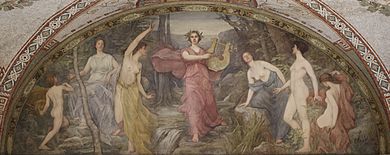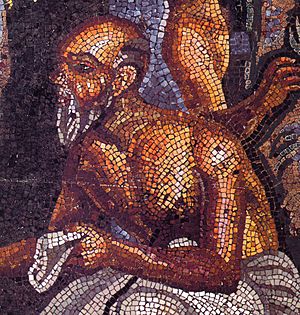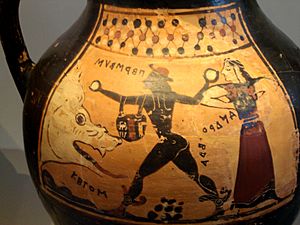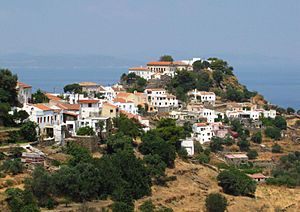Simonides of Ceos facts for kids
Simonides of Ceos (born around 556 BC, died around 468 BC) was a famous Greek lyric poet. He was born on the island of Ceos. Ancient scholars in Hellenistic Alexandria thought he was one of the nine most important lyric poets.
Simonides was known for his new ways of writing poetry. He was also very involved in the big events and with important people of his time. Many stories say he was one of the wisest men. He was also known for being very careful with money. He is even said to have invented a way to remember things, called mnemonics. He might have also invented some letters of the Greek alphabet.
His poems often showed simple human feelings in a touching way. He is especially famous for writing short poems called epitaphs. These were often for soldiers who died in battle. A well-known example is for the Lacedaemonians (Spartans) at the Battle of Thermopylae:
|
Ὦ ξεῖν', ἀγγέλλειν Λακεδαιμονίοις ὅτι τῇδε |
Tell them in Lacedaemon, passer-by |
| —Translated by F L Lucas |
Today, we only have small parts of his poems. These are found on old papyrus pieces or in quotes by ancient writers. But new pieces are still being found by archaeologists in Oxyrhynchus, Egypt.
Contents
Who Was Simonides?
Not many clear facts about Simonides' life are known today, even though he was very famous. Ancient sources are not even sure about his exact birth date. Most modern experts agree he lived from about 556 BC to 468 BC. This means he lived to be about 89 years old.
Simonides was known for inventing four letters of the Greek alphabet. He was also one of the first major poets to write verses that were meant to be read, not just sung or spoken.
Early Life and Travels
Simonides was born in Ioulis on the island of Ceos. This island was known for its music and sports. People from Ceos often sent choirs to sing hymns for the god Apollo. Simonides might have worked as a teacher in a choir school there when he was young.
Around age 30, Simonides moved to Attica, near Athens. He was drawn by the chances to work for Hipparchus, a ruler who supported artists. Later, he moved to Thessaly, where powerful families like the Scopadae and Aleuadae protected him.
One famous story tells of a time when Simonides wrote a poem for a boxer. He included many mentions of the twin heroes, Castor and Pollux. The boxer's patron, Scopas, said he would only pay half the fee. He told Simonides to get the other half from the twins.
A Miraculous Escape
According to the story, Simonides was at a banquet with Scopas and his family. He was called outside to meet two young men. When he went out, he found no one there. But as soon as he left, the dining hall collapsed, killing everyone inside. People believed the two young men were Castor and Pollux. They had saved Simonides' life because he honored them in his poem.
This event is said to have inspired Simonides to create a memory system. He realized he could remember where each person was sitting before the hall collapsed. This helped him identify the bodies. He used this idea to develop the "method of loci" or "memory palace." This system helps people remember things by linking them to specific places. It was used for a long time in societies that relied on spoken information.
The Persian Wars
Simonides returned to Athens during the Persian Wars. He became a very important figure at this time. He wrote many poems to remember fallen soldiers and victories.
He wrote epitaphs for Athenians, Spartans, and Corinthians. He also wrote a song for Leonidas and his brave men at Thermopylae. His poems celebrated the battles of Artemisium, Salamis, and Plataea. His ability to write movingly about war made him very popular among the Greek states.
Later Life in Sicily
Simonides spent his last years in Sicily. He became a close friend of Hieron of Syracuse, a powerful ruler. He even helped make peace between Hieron and another ruler, Theron of Acragas.
Some stories say Simonides and the poet Pindar were rivals at Hieron's court. However, these stories are not always reliable. Simonides was buried outside Acragas, and his tombstone was later used to build a tower.
Simonides' Character
Traditional stories about Simonides show different sides of his personality.
The Inventor
Simonides is famous for developing the "memory palace" system. This system helped people remember long lists or speeches by imagining items in a familiar place, like a house.
He was also credited with inventing some musical notes for the lyre. And, as mentioned, he might have invented four letters of the Greek alphabet. These claims show he had a very creative and original mind.
The Wise Man

"Simonides calls painting silent poetry and poetry painting that speaks." — Plutarch.
Many ancient writers considered Simonides a very wise man. The philosopher Plato even called him "wise and divinely inspired."
Some famous sayings are linked to him:
- He said that "the word is the image of the thing."
- He believed it was better to keep silent than to speak and regret it.
- He famously said, "Simonides calls painting silent poetry and poetry painting that speaks." This means that paintings tell a story without words, and poems create pictures with words.
When Hieron of Syracuse asked him to define god, Simonides kept putting off his answer. He said, "the longer I think, the harder it seems." This shows his thoughtful approach to big questions.
The Miser
Some ancient stories paint Simonides as someone who loved money. The playwright Aristophanes joked that Simonides would do anything for money, even sail in a sieve.
One story says he had two boxes: one empty for favors and one full for money. This suggested he valued money more than favors. Another story says he sold most of the food he received from Hieron. He said this showed Hieron's generosity and his own simple needs.
When asked if it was better to be rich or wise, he supposedly said, "Wealthy; for I see the wise spending their days at the doors of the wealthy." These stories might just mean he was one of the first poets to charge fees for his work.
Simonides' Poetry
Simonides wrote many types of poems. He is often given credit for creating a new type of choral song called the encomium, which praised people. He also helped make the "victory ode" popular. These were songs celebrating winners of athletic contests.
He was also the first to make the choral dirge (a sad song for the dead) a recognized form of poetry. He was very good at writing lively songs for dancing, too. He won many poetry competitions, possibly 57 victories in Athens.
Simonides wrote longer poems about the Persian Wars. These included a "Dirge for the Fallen at Thermopylae" and poems about the battles of Artemisius and Salamis. He also wrote about the lead-up to the Battle of Plataea.
Poetic Style
Simonides used descriptive words and phrases in his poems. But he was also known for being clear and simple in his writing. He used straightforward language.
His poems often talked about how quickly things change in life. He used images like a "long-winged fly" to show how fragile human life can be. His style helped to create a feeling that matched the meaning of his words.
See also
 In Spanish: Simónides de Ceos para niños
In Spanish: Simónides de Ceos para niños
 | Stephanie Wilson |
 | Charles Bolden |
 | Ronald McNair |
 | Frederick D. Gregory |




